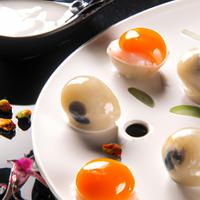
1 serving (50 grams) contains 80 calories, 4.0 grams of protein, 3.0 grams of fat, and 10.0 grams of carbohydrates.

Log this food in SnapCalorie

Nutrition Information
Calories |
379.1 | ||
|---|---|---|---|
% Daily Value* |
|||
| Total Fat | 14.2 g | 18% | |
| Saturated Fat | 4.7 g | 23% | |
| Polyunsaturated Fat | 0 g | ||
| Cholesterol | 189.6 mg | 63% | |
| Sodium | 710.9 mg | 30% | |
| Total Carbohydrates | 47.4 g | 17% | |
| Dietary Fiber | 2.4 g | 8% | |
| Sugars | 4.7 g | ||
| protein | 19.0 g | 38% | |
| Vitamin D | 47.4 mcg | 237% | |
| Calcium | 94.8 mg | 7% | |
| Iron | 2.4 mg | 13% | |
| Potassium | 237.0 mg | 5% | |
* Percent Daily Values are based on a 2,000 calorie diet. Your daily values may be higher or lower depending on your calorie needs.
Food Attributes
Source of Calories
About Quail egg dumpling
Quail Egg Dumplings are bite-sized delights originating from Asian cuisine, often cherished as street food or appetizers. Typically wrapped in thin dumpling skins, these treats encase a soft-boiled quail egg alongside savory fillings like minced meat, seafood, or chopped vegetables, enhanced with spices and aromatic seasonings. The dumplings are usually steamed, fried, or boiled, offering varying textures and flavors. Quail eggs are nutrient-dense, boasting high levels of protein, essential vitamins such as B12, and minerals like iron, while being lower in calories compared to larger chicken eggs. Depending on the cooking method and accompanying ingredients, these dumplings can be either nutritious or indulgent. Fried versions may add extra fat and calories, while steamed options remain lighter. Moderate consumption is recommended, as high cholesterol content in quail eggs may not suit all dietary needs. Overall, Quail Egg Dumplings are versatile, flavorful morsels that celebrate culinary creativity and balanced nutrition.



